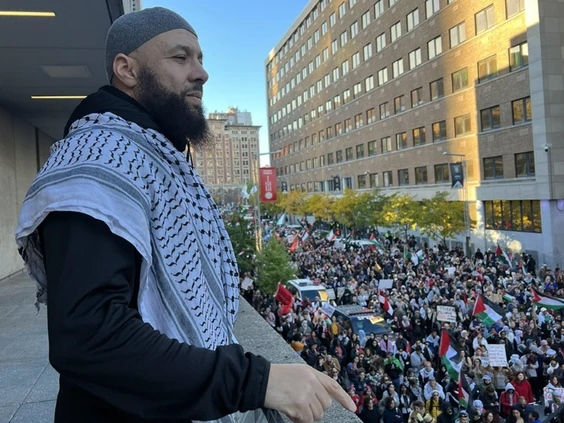In this pride-starved country, a little bit of nationalism will go a long way

Adil Charkaoui addresses thousands of demonstrators gathered near Place des Arts in Montreal on Oct. 28, 2023, as part of a worldwide day of pro-Palestinian protests against the Israel-Hamas war and the bombing of Gaza. PHOTO BY TWITTER
(Written and published here by the National Post, republished with permission.)
In recent months, we have witnessed a critical mass of antisemitic Canadians willing to vandalize Jewish businesses, protest relentlessly for a Palestinian nation-state “from the river to the sea” and even threaten police officers with death.
It’s not entirely clear how much of the blame for this despicable behaviour can be placed on the fundamentally racist ideology of diversity, equity and inclusion that has been allowed to fester in universities for years, and how much is a result of the erosion of shared values among Canadians.
But one thing is clear: an immigration policy guided by blind faith in “diversity” and “shared values” — two phrases used extensively by Prime Minister Justin Trudeau — hasn’t helped maintain a peaceful, pluralistic society.
Under Trudeau’s post-national vision of Canada, the common ground shared between Canadians is just that: the land we all live on, enclosed within the same border.
Addressing Parliament in October, following a series of antisemitic crimes committed against Canadian Jews in the aftermath of Hamas’s attack against Israel, Trudeau made sure to praise the “shared values” we all supposedly have.
“Let us remember who we are as Canadians and what we stand for here and around the world: respect for everyone’s rights and freedoms and the rule of law; respect for different languages, ethnicities and religions; respect for human life; and respect for each other,” he said.
Yet his leadership has brought about a much different reality. It should be a shared Canadian value, for example, to abhor calls for annihilating Jews and celebrations of terrorist butchery. In reality, it’s not — the past few months have provided ample evidence.
One prominent example is that of Adil Charkaoui, who asked Allah to kill all the Jews in a public prayer he led in Montreal in October. Charkaoui came to Canada from Morocco and obtained citizenship, despite undergoing 20 years of police investigations for alleged Islamist links.
Diversity is a strength, and immigration is a force for good. Chinese-Canadians helped build the railway; Ukrainian-Canadians settled the western Prairies; Irish-Canadians populated Atlantic Canada; Italian-Canadians, German-Canadians and others filled labour gaps and took up agriculture.
Each group faced discrimination and hardship, but they eventually assimilated into Canada, a budding democracy unapologetically loyal to the Crown. They took pride in their home, building monuments and naming schools to memorialize those who helped build this country. It wasn’t perfect, but Canada became an example for the world for how diverse cultures can live together in peace.
Our pluralism is enviable.
Nowadays, immigrants (and other Canadians) are told a dark, cynical story about their new home that stems not from foreign propaganda, but from the office of the prime minister himself.
Trudeau has declared not only that Canada’s residential schools amounted to a genocide — a crime under international law — but that the supposed genocide against Indigenous people is still ongoing. In 2020, he said that Canada is also plagued with racism, which infects “all our institutions,” placing our affirmative-action-embracing country among the likes of Rwanda and apartheid South Africa.
Trudeau’s fight against “Canadian exceptionalism” has been so effective that foreign publications like Al-Jazeera and China’s Global Times happily join him in putting Canada in its place.
“The whites continue to take up most resources — from land to properties — in Canada, and the Indigenous people continue to suffer from systematic discrimination and exclusion,” read a 2021 Global Times editorial. “Canada was founded on cultural and ethnic genocide.… It should return the land grabbed from the Indigenous people.”
Aside from fuelling international propaganda, Canadian governments have largely been successful in stamping out Canada’s national symbols and denigrating our shared history. Ottawa’s Sir John A. Macdonald Parkway has been renamed; historical illustrations have been removed from the latest passport; the citizenship ceremony, which should be a stately occasion, may soon be reduced to a virtual box-clicking exercise.
The message sent to our one-million newcomers per year is that Canada is an unimportant, historically unremarkable country driven by a vicious desire to abuse, discriminate against and extinguish Indigenous and other non-European cultures. If some aren’t interested in embracing traditional Canadian values, who can blame them? There’s little to be proud of, according to Trudeau’s historical revisionism.
This couldn’t be further from the truth. Canada has a history of military prowess (not so much anymore, but it was once a point of pride) and economic development, and has successfully integrated many waves of immigrants from all around the world.
But with every depiction of a bloody Star of David at a protest, it becomes more and more apparent that Canada’s value-neutral, open-doors approach to immigration could threaten the very pluralistic values that it tries to uphold.
We have the moral authority to enforce, for example, a “no antisemitism allowed” standard among those who want to live here, so perhaps we should. This could involve screening potential newcomers for Canadian values — an idea that has garnered support in the past — or enhancing the government’s ability to deport those who clearly don’t share our values.
Newcomers and Canadian-born citizens alike need a national — not post-national — identity to unite around. If Canadian pluralism is to survive, our culture needs to do more than celebrate empty notions of diversity and relentlessly litigate racial grievances. In this pride-starved country, a little bit of nationalism will go a long way.








